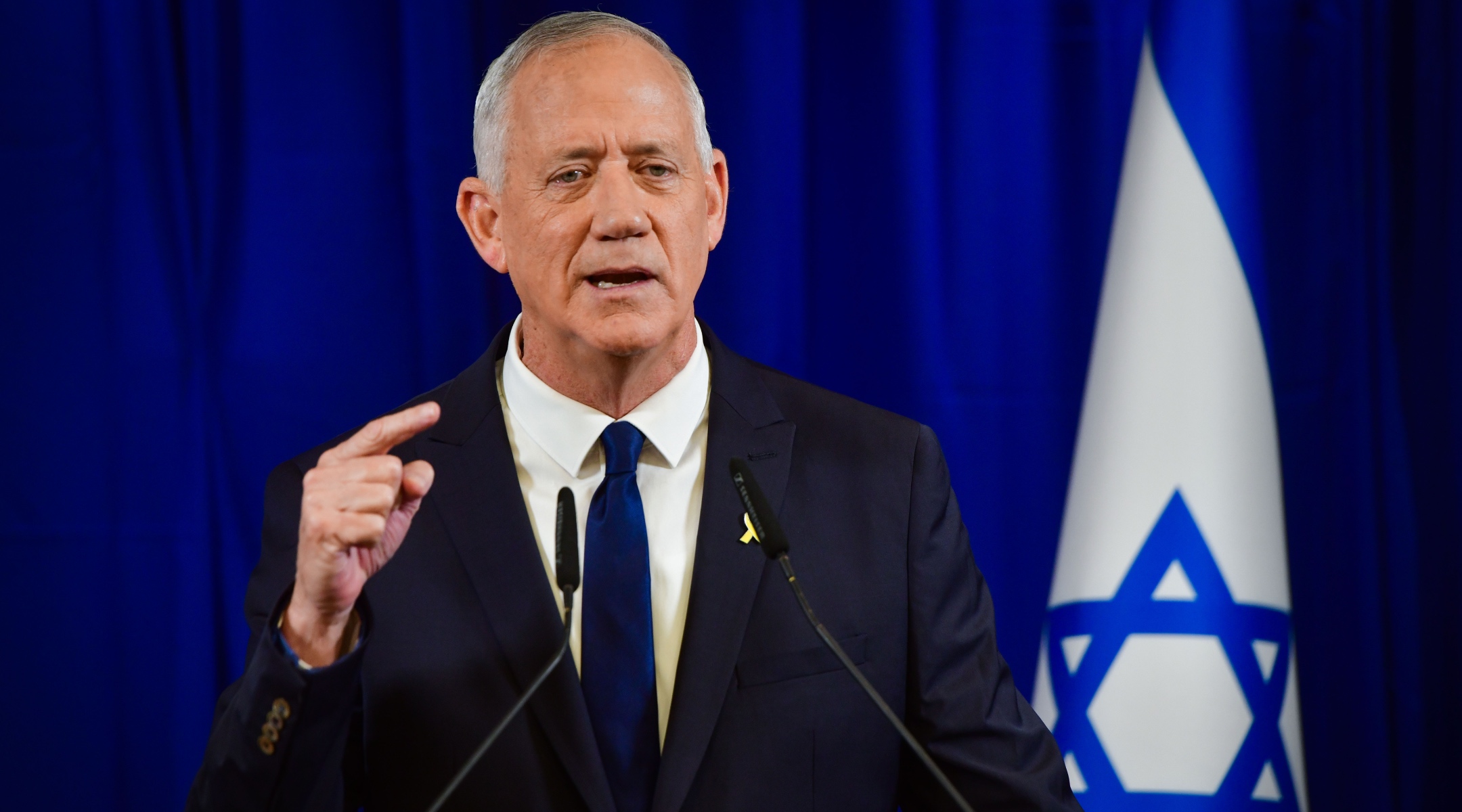Benny Gantz quits war cabinet as Israeli government’s unified front crumbles
Gantz is positioning himself as a rival to Netanyahu

Head of the National Unity party Minister Benny Gantz holds a press conference in Ramat Gan, June 9, 2024. (Avshalom Sassoni/Flash90)
Former Defense Minister Benny Gantz quit Israel’s three-person war Cabinet, repositioning himself as a potential replacement for his longtime rival Prime Minister Benjamin Netanyahu as the unity that defined Israel’s initial response to the war against Hamas is crumbling.
Gantz’s departure from the coalition Sunday, along with that of Gadi Eisenkot, a minister without portfolio in the broader cabinet, and another six Knesset members, came just a day after an Israeli operation freed four hostages held by Hamas. Gantz, who joined the government and war cabinet shortly after Hamas’ invasion of Israel on Oct. 7, had planned his resignation for Saturday, but delayed his announcement while Israel celebrated the return of the hostages to their homes.
He had previously set an ultimatum of June 8 for Netanyahu to present a substantive plan for governance of Gaza after the war.
“To my sorrow, Netanyahu is keeping us from advancing to true victory which is the justification for the painful and ongoing price,” Gantz said in a televised address. “Therefore we are leaving the unity government with a heavy but whole heart.”
Netanyahu’s original coalition, formed in December 2022, still commands 64 out of 120 seats in the Knesset and appears to be stable, so Gantz’s announcement does not put the prime minister in danger of soon being forced to elections. Gantz, nonetheless, continues to outpace Netanyahu in election polls and is the likeliest rival to face him should Netanyahu call elections before his term ends in 2026.
But the failure to roust Hamas from the enclave after it launched the war, the failure to recover all the hostages — more than 100 remain captive, living and dead — and the erosion of international support for Israel as the war claims a mounting civilian death toll has gutted the unity that coalesced after Oct. 7 .
The departure of Gantz and Eisenkot comes just weeks after another faction, led by Gideon Saar, another Netanyahu rival, left the government.
The main criticism of Netanyahu, among those resigning and in the streets, where tens of thousands of protesters continue to convene, is that he has not presented a plan to decisively end the war, or to explain what happens the day after.
“Despite the strenuous efforts of myself and my colleagues, the Cabinet under your leadership has for some time avoided the determinative decisions required to end the war,” Eisenkot said in his resignation letter. Eisenkot lost a son to battle earlier in the war.
The Biden administration, increasingly at odds with Netanyahu over the war’s conduct, had found an ally in Gantz, who infuriated Netanyahu by consulting separately with U.S. government officials. Netanyahu is scheduled next month to address Congress, where he hopes to rally support for how he is conducting the war.
This article originally appeared on JTA.org.
A message from our CEO & publisher Rachel Fishman Feddersen
I hope you appreciated this article. Before you go, I’d like to ask you to please support the Forward’s award-winning, nonprofit journalism during this critical time.
We’ve set a goal to raise $260,000 by December 31. That’s an ambitious goal, but one that will give us the resources we need to invest in the high quality news, opinion, analysis and cultural coverage that isn’t available anywhere else.
If you feel inspired to make an impact, now is the time to give something back. Join us as a member at your most generous level.
— Rachel Fishman Feddersen, Publisher and CEO